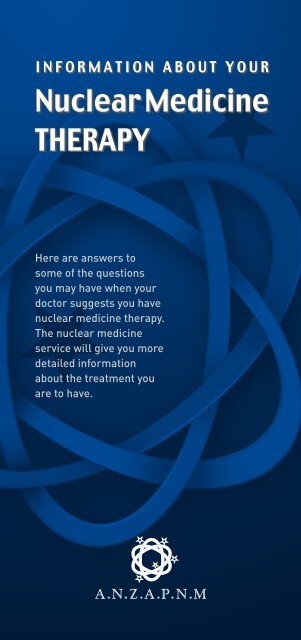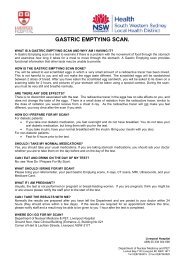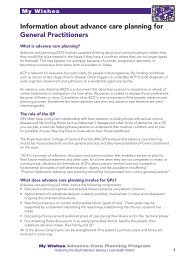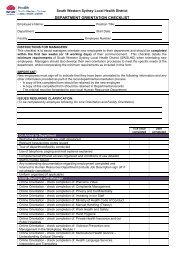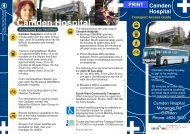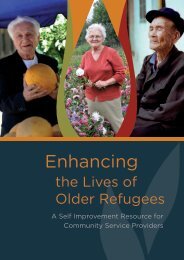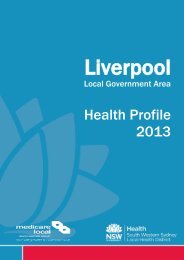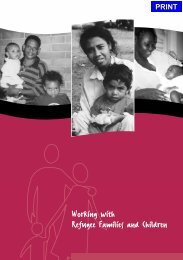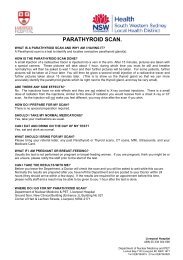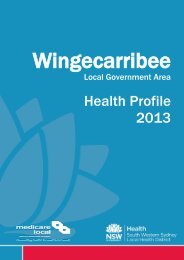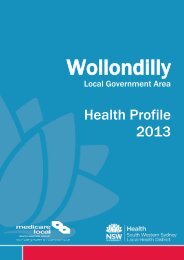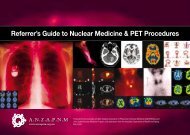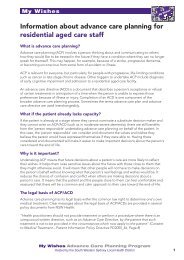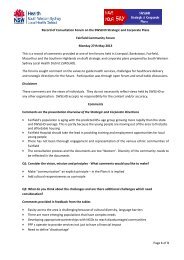Nuclear Medicine Therapy Guide
Nuclear Medicine Therapy Guide
Nuclear Medicine Therapy Guide
Create successful ePaper yourself
Turn your PDF publications into a flip-book with our unique Google optimized e-Paper software.
I N F O R M A T I O N A B O U T y o u r<br />
<strong>Nuclear</strong> <strong>Medicine</strong><br />
THERAPY<br />
Here are answers to<br />
some of the questions<br />
you may have when your<br />
doctor suggests you have<br />
nuclear medicine therapy.<br />
The nuclear medicine<br />
service will give you more<br />
detailed information<br />
about the treatment you<br />
are to have.
What is nuclear medicine therapy?<br />
Radioactive material, called radiopharmaceuticals,<br />
can be used to treat certain conditions. This is<br />
called nuclear medicine therapy.<br />
<strong>Nuclear</strong> medicine therapy is most commonly used<br />
to treat an overactive thyroid gland - a condition<br />
known as thyrotoxicosis or hyperthyroidism - and<br />
thyroid cancer. The radiopharmaceutical used is<br />
iodine 131, commonly called radioiodine. Other<br />
radiopharmaceuticals are used to treat some types<br />
of arthritis and some other types of cancer, and to<br />
relieve the pain from cancer that has spread to bone.<br />
What is radiation?<br />
Radiation is a type of energy that exists in our<br />
environment in many forms. It comes from both<br />
natural sources (the warmth and light from the<br />
sun) and man-made sources (such as microwave<br />
radiation for cooking food).<br />
Ionising radiation is a higher energy form of<br />
radiation that comes from both natural and manmade<br />
sources. It comes from the sun, the earth,<br />
the air and our food and drink, and from building<br />
materials such as bricks. This is the natural<br />
background radiation to which everyone is exposed.<br />
<strong>Nuclear</strong> medicine therapy uses ionising radiation,<br />
as do x-rays.<br />
How does nuclear medicine therapy work?<br />
Cancer cells and some other cells affected by<br />
disease are more sensitive to radiation than normal<br />
cells. The radiopharmaceutical kills cancer cells<br />
and it can help to control inflammation in the joints<br />
of people with arthritis.<br />
The radiopharmaceutical gets to the cells to be<br />
treated in different ways for different parts of the<br />
body. For example, radioiodine is swallowed in a<br />
capsule or liquid form. It passes into the blood and<br />
then is concentrated from the blood by the thyroid<br />
gland, where it begins to act on the gland’s cells.
Is nuclear medicine therapy safe?<br />
Yes, nuclear medicine therapy is very safe. Any risk<br />
to you from the radioactivity is very small compared<br />
with the benefit you are expected to get from this<br />
treatment. Any radiopharmaceutical<br />
not taken up by the part of the body<br />
being treated will leave your body,<br />
usually in your urine, faeces, sweat<br />
or saliva. Mostly, this occurs over<br />
one to two weeks but can take longer<br />
depending on the type of therapy.<br />
Also, radiopharmaceuticals soon lose<br />
their radioactivity.<br />
The small amount of radiation from<br />
this treatment will benefit you but not<br />
other people. Therefore, you will need<br />
to take some safety measures to keep<br />
the radiation dose to other people as<br />
low as possible. The safety measures<br />
you should take are explained below.<br />
Is any special preparation needed for<br />
nuclear medicine therapy?<br />
There is some special preparation for most types<br />
of nuclear medicine therapy. For example, patients<br />
may need to stop<br />
If you are pregnant or think you could<br />
be pregnant, or you are breastfeeding it<br />
is very important that you tell your doctor<br />
and the nuclear medicine service staff<br />
before they give you the therapy dose.<br />
Many nuclear medicine services require<br />
all women of child-bearing age to have<br />
a pregnancy test within 24 hours before<br />
therapy unless they have had a surgical<br />
procedure to prevent pregnancy.<br />
You must not become pregnant for at least<br />
six months after some types of therapy.<br />
You should also tell the nuclear medicine<br />
service staff if you are incontinent.<br />
taking medication for<br />
an overactive thyroid<br />
gland before nuclear<br />
medicine therapy. The<br />
nuclear medicine staff<br />
will tell you if any special<br />
preparation is needed<br />
for your treatment.<br />
Please read the<br />
information given to you<br />
before your appointment.<br />
If there is anything you<br />
don’t understand, the<br />
nuclear medicine staff<br />
will be happy to answer<br />
your questions.<br />
What are the benefits of nuclear<br />
medicine therapy?<br />
<strong>Nuclear</strong> medicine therapy is an effective and safe<br />
treatment for certain conditions. Your doctor will<br />
discuss treatment choices with you.<br />
Will I have to stay in hospital?<br />
This depends on why you are having nuclear<br />
medicine therapy. If you are being treated for<br />
thyroid problems, you will usually be treated as an<br />
outpatient and will not need to stay in hospital. For<br />
some other sorts of therapy, you will usually have<br />
to stay in hospital for two or three days. This is not<br />
because of any risk to your health but to make sure<br />
radioactive materials are dealt with safely when<br />
they leave your body.<br />
What does nuclear medicine therapy<br />
involve?<br />
This depends on the type of therapy. The nuclear<br />
medicine service where you are to have your<br />
treatment will explain what will happen in detail. To<br />
give you some idea of what to expect, here are short<br />
descriptions of some of the more common types of<br />
therapy.<br />
• To treat an overactive thyroid gland or thyroid<br />
cancer, the radiopharmaceutical (radioactive<br />
iodine 131) is swallowed in a capsule or liquid<br />
form. It is tasteless and has no smell. Patients<br />
are usually treated as outpatients and do not<br />
need to stay in hospital. Only a single dose is<br />
usually needed, although sometimes more than<br />
one treatment may be needed.
• To treat joint pain and some types of arthritis,<br />
the radiopharmaceutical is injected into the joint<br />
fluid under local anaesthetic. Afterwards, the<br />
joint will be immobilised with a bandage and<br />
light splint. Patients may go home to rest but<br />
are sometimes asked to stay in hospital for a<br />
short time.<br />
• To relieve the pain from cancer that has spread<br />
to bone, the radiopharmaceutical is injected into<br />
a vein in the arm. This feels like having a blood<br />
test. Patients are usually treated as outpatients<br />
and do not need to stay in hospital. The pain<br />
may increase for a short time up to 10 days<br />
after treatment. This is managed by increasing<br />
painkillers until the pain decreases.<br />
Pain relief usually lasts for up to six months. If the<br />
pain comes back, the treatment may be repeated.<br />
What safety measures should I take after<br />
nuclear medicine therapy?<br />
The simple safety measures you should take and for<br />
how long depend on the type of therapy you have.<br />
Some of the safety measures you may need to take<br />
- for as little as 24 hours to as long as 10 days - are<br />
briefly described below.<br />
• Most of the radiopharmaceutical leaves the body<br />
in urine so it is important to have good toilet<br />
hygiene.<br />
– Wipe up any spilled urine with toilet paper<br />
and put the toilet paper in the toilet.<br />
– Flush the toilet twice after each use and<br />
wash your hands well after using the toilet.<br />
– Males should use a normal toilet rather than<br />
a urinal.<br />
• Limit the time spent in close contact with people.<br />
– Avoid contact with pregnant women and<br />
small children.<br />
– A good guide is to stay more than one arm’s<br />
length away from people.<br />
– Sleep in a single bed if possible.<br />
– Avoid unnecessary trips on public transport<br />
and attending public entertainment. You<br />
could be sitting next to a pregnant woman.<br />
– Do not go to work if this involves prolonged<br />
contact with people.<br />
• Wash your hands well before preparing food and<br />
use single-use disposable gloves during food<br />
preparation.<br />
• Use disposable eating utensils or wash your<br />
utensils separately.<br />
• Wash any bed linen, towels or clothes that are<br />
soiled with urine or blood at once and separately.<br />
Wash your bed linen, towels and clothes at home,<br />
separately. No special cleaning of the washing<br />
machine is needed between loads.<br />
Before you leave, the nuclear medicine staff<br />
will explain in more detail the safety measures<br />
needed for the sort of therapy you are to have and<br />
for how long after the therapy you need to take<br />
special precautions.<br />
Are there any side effects?<br />
Side-effects can occur after nuclear medicine<br />
therapy. Usually these are minor. Your doctor will<br />
discuss in detail what other complications could<br />
occur in your case and explain things you can do to<br />
reduce or avoid side effects.<br />
The nuclear medicine staff will be happy to<br />
answer your questions before or during your<br />
treatment, or after you have gone home.<br />
If you would like more detailed information<br />
on your treatment, please talk to your doctor<br />
or nuclear medicine specialist.<br />
Produced by the Australian and New Zealand Association of Physicians in <strong>Nuclear</strong> <strong>Medicine</strong> (ANZAPNM) as part<br />
of its Quality <strong>Nuclear</strong> <strong>Medicine</strong> Program, with assistance from the Australian Department of Health and Ageing.<br />
May 2009


